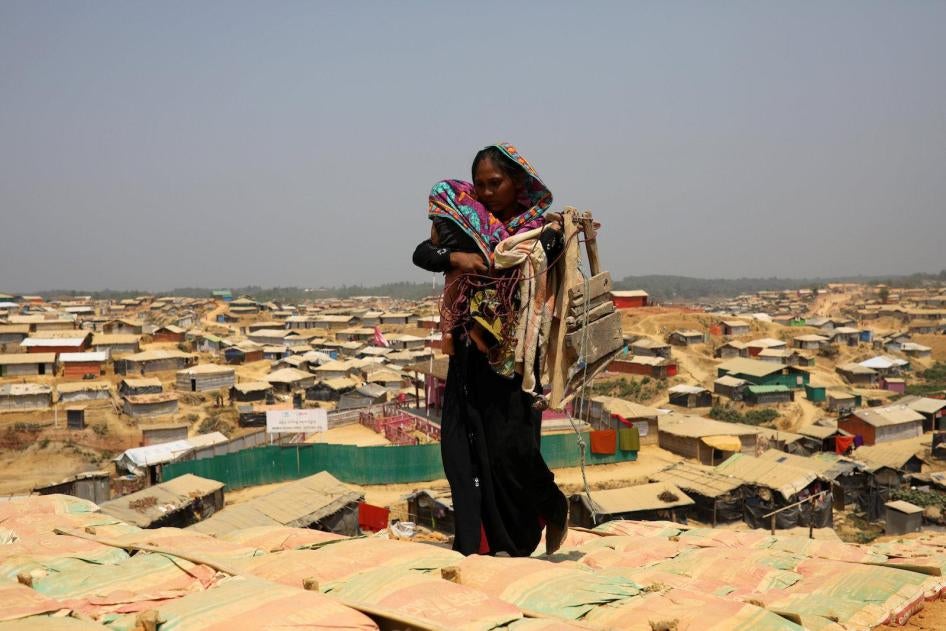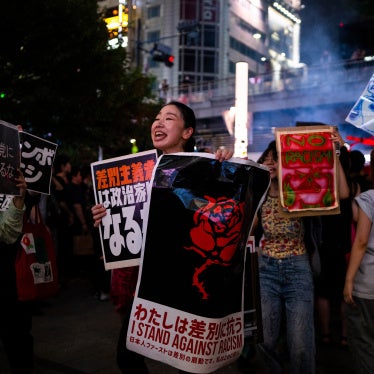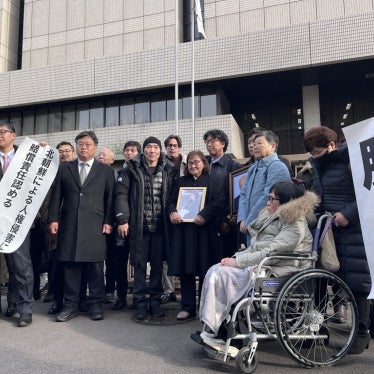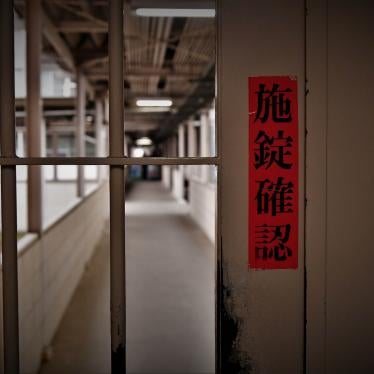When Human Rights Watch in November criticized the Japanese government’s ineffective “quiet diplomacy” surrounding the Rohingya crisis in Myanmar, netizens on one of Japan’s most popular mainstream websites were swift to criticize. “Aren’t you criticizing the wrong country?” one user wrote. “I don’t understand why Japan has to be called out.” Similar voices were echoed over 700 times in a matter of days.
It’s unlikely that their views represent Japan’s public sentiment on the Rohingya crisis. But their rhetoric provides a glimpse into the minds of those who either are unaware of or refuse to acknowledge Japan’s shameful track record of looking the other way on human rights abroad when it has mattered most.
For more than 40 years, Japan prided itself on having the world’s second-largest economy. That changed in 2010 when China’s economy surpassed Japan’s. China’s economic power has translated directly into diplomatic power through public and private investments, and support for abusive governments around the world. The Japanese government’s response appears to be to embrace those very same abusive governments.
In 2017 the Myanmar military committed mass killings, sexual violence and widespread arson against Rohingya Muslims that United Nations fact-finders have described as genocide and crimes against humanity. Their brutality forced more than 700,000 Rohingya to flee to neighboring Bangladesh, where they live in miserable conditions.
In response, the U.N. General Assembly and Human Rights Council have both condemned the Myanmar authorities for the atrocities, demanded justice and called for Myanmar to fully respect the rights of Rohingya, including by granting them full access to citizenship. In December 2017, several months after military operations began, the U.N. General Assembly adopted a resolution that called on the Myanmar government to end excessive military force against the Rohingya. While over 130 countries supported the resolution, Japan abstained.
In May, when the Myanmar government announced it will establish a supposedly independent Commission of Enquiry to investigate the abuses against the Rohingya, Foreign Minister Taro Kono welcomed it with open arms. This followed repeated statements by the military and government denying abuses and a series of failed official commissions that a former Thai foreign minister called a sham.
The government made its intentions clear on Aug. 29 when a presidential spokesman, Zaw Htay, stated that the commission was formed to “respond to false allegations made by the U.N. agencies and other international communities.” The commission’s chair, Rosario Manalo, said at the commission’s first news conference, “I assure you there will be no blaming of anybody, no finger-pointing of anybody.”
Japan’s Foreign Ministry inexplicably plays along with this fiction, calling the commission “independent.” The ministry has also claimed that a Japanese member of the commission — former Ambassador to the U.N. Kenzo Oshima — joined in his personal capacity and not with the Japanese government’s backing.
In September, at the Human Rights Council, 35 countries passed a resolution that mandates a new international body to “collect, consolidate, preserve and analyze evidence of the most serious international crimes” in Myanmar since 2011 and to “prepare files … to facilitate and expedite fair and independent criminal proceedings.”
The action followed the U.N. Fact-Finding Mission on Myanmar, which found that Myanmar’s security forces committed war crimes, crimes against humanity and genocide against the Rohingya. The report also examined abuses by the Arakan Rohingya Salvation Army and by government forces and ethnic armed groups in Shan and Kachin states.
Yet again Japan abstained, because it apparently believes that the Myanmar government and its own Commission of Enquiry can do its own investigation.
This is part of a troubling pattern of a weak Japanese human rights foreign policy, such as with Hun Sen’s dictatorial rule in Cambodia and Rodrigo Duterte’s murderous “drug war” in the Philippines. Despite overwhelming votes condemning Myanmar at the U.N., each time Japan has passively looked on, attempting to curry favor with the Myanmar government and military at the expense of protecting some of the world’s most vulnerable people. Japanese officials and politicians defend their approach by saying they want to maintain Japan’s position as a major economic partner and prevent China from taking its place.
Japan used to claim a “values-oriented” diplomacy. But faced with the rise of China and its growing global influence, the Japanese government is now playing a losing game of “values-free diplomacy” in the region.
Some even point out that while Japan abstained from voting on resolutions surrounding the Rohingya crisis, China voted against them. The implication is that Japan isn’t as bad as China.
But as Nobel Peace Prize winner and human rights activist Desmond Tutu once said, “If an elephant has its foot on the tail of a mouse and you say that you are neutral, the mouse will not appreciate your neutrality.” Japan needs to rediscover its values and join the overwhelming majority of the nations of the world to publicly condemn these atrocities and put pressure on Myanmar’s government to find justice for the Rohingya.









